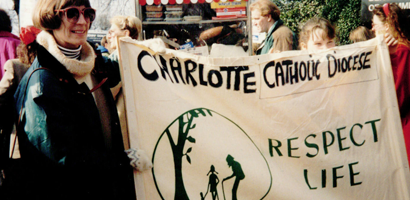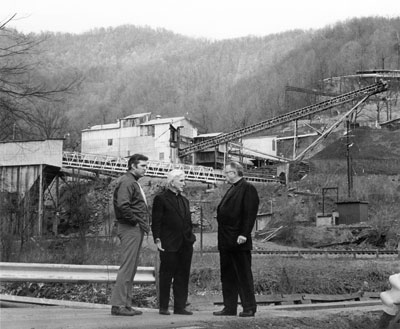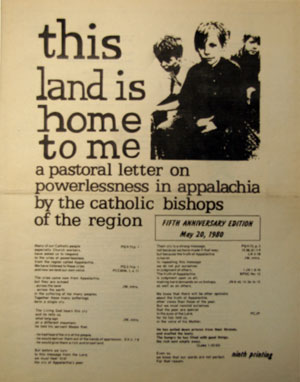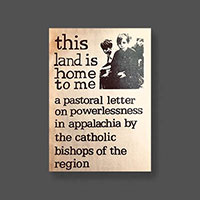 For more than six decades, the charitable work of the Church in western North Carolina has been organized and led by Catholic Social Services. The wide range of assistance that Catholic Social Services offers illustrates the Church's commitment to serving all people in need across the diocese.
For more than six decades, the charitable work of the Church in western North Carolina has been organized and led by Catholic Social Services. The wide range of assistance that Catholic Social Services offers illustrates the Church's commitment to serving all people in need across the diocese.
Bishop Vincent S. Waters of the Diocese of Raleigh first incorporated the Bureau of Catholic Charities on April 24, 1948. Within a year, a branch was opened in Charlotte.
Following a mid-century trend among some Catholic Charities agencies, Bishop Waters and the corporate board of directors changed the agency's name from the Bureau of Catholic Charities to Catholic Social Services Inc. in 1962.
In 1973, not long after the founding of the Diocese of Charlotte, Bishop Michael J. Begley set up the diocese's own Catholic Social Services agency, and its mission – to serve people in need across the 46 counties of western North Carolina – has continued to be one of the top priorities of every bishop since.
FOUNDING DIRECTOR
Catholic Social Services was originally staffed by three sisters from the Missionary Servants of the Blessed Trinity, an order of Catholic sisters devoted to education, health care and social services. The sisters provided pregnancy support, maternity care, foster care and adoption services to families throughout the state.
Elizabeth Thurbee was the first layperson hired by the Trinitarian sisters in 1980 to head the agency's adoption program. She eventually rose to head the entire agency, retiring in 2010.
Thurbee met the three Trinitarian sisters in 1975, when she was the public information officer for the Mecklenburg County Department of Social Services and they called her for information about Charlotte.
Five years later – out of the blue – Trinitarian Sister Barbara DeMoranville called Thurbee to offer her the agency's new position of adoption supervisor. Thurbee recalls being concerned about being tapped for the job, which would cover the diocese's 46 counties. Her children were still young, and she needed a part-time schedule.
But the sisters were adamant about Thurbee taking the job, and they agreed to a family-friendly work schedule for her so she could say yes.
Thurbee recalls, "I asked Sister Barbara (after accepting the job), 'You were so persistent. Why did you call me, anyway?'" Sister Barbara told her that the Trinitarian Sisters had been praying about someone to take the position and nothing had happened. But the morning Sister Barbara called Thurbee, she said, "I woke up at four o'clock in the morning with your name in my mind. So I knew that was what we were supposed to do."
That was the start of Thurbee's 30 years of service with the diocese. She worked with all four of the diocese's bishops, helping to develop and steer Catholic Social Services to meet growing and changing charitable needs.
Under Thurbee's leadership, programs such as burial assistance, counseling services, elder ministry, family life services, the food pantry, refugee resettlement, and educational programs for the Office of Justice and Peace evolved. The Diocese of Charlotte Housing Corp., specializing in low-income housing for the elderly was also established.
CSS SERVICES
Since its beginning with the three Trinitarian sisters, Catholic Social Services has grown to a staff of more than 60 professionals.
Its physical space has expanded from one office at a Charlotte church to an administrative office in Charlotte – which houses the Charlotte Regional Office, the Justice and Peace Office, the Family Life Office, and the Refugee Resettlement Office – and satellite offices in Asheville, Winston-Salem, Greensboro and Murphy.
The offices offer a wide range of services, acting as the hands of Jesus to people and families in need across the diocese. Free or reduced-cost services to anyone – whether they are Catholic or not – include foster care, adoption and pregnancy services; individual, marriage and family counseling; distribution of food and material assistance; marriage preparation; natural family planning; financial literacy; justice and peace education and advocacy; elder ministry; legal immigration services; refugee resettlement aid; Respect Life education and advocacy; teen parenting help; translation services; and more.
Demonstrating Catholic Social Services' commitment to quality services in all areas, the agency applied for accreditation by the Council on Accreditation, a national accrediting body for human service agencies. The agency received that accreditation in 2007 and was reaccredited in 2011.
A CURRENT SNAPSHOT
During its 2010-'11 fiscal year, Catholic Social Services was called upon to assist more people during difficult financial times. In the Charlotte office alone, more than 109,000 pounds of food were distributed to 1,893 children and 2,544 adults. Counseling services totalling 2,554 hours were provided to 355 individuals, couples and groups. Marriage preparation and Natural Family Planning classes were offered to 502 couples.
The Refugee Resettlement Office assisted 298 refugees and asylum seekers from 14 countries. They also provided 3,473 hours of English language instruction to assist them in resettlement and adaptation to life in America.
Dr. Gerard Carter, who succeeded Thurbee as executive director of Catholic Social Services, sums up the mission of Catholic Social Services in western North Carolina: "As a ministry of the Diocese of Charlotte, Catholic Social Services works closely with our clergy and laity to bring hope and healing to those in need, especially those who are poor and marginalized. Our work centers on three key service areas of ministry – strengthening families, building communities and reducing poverty."
— SueAnn Howell, staff writer. Dr. Gerard Carter, executive director of Catholic Social Services, contributed.
EDITOR'S NOTE: The Diocese of Charlotte was founded on Jan. 12, 1972. To celebrate the 40th anniversary of the diocese and the history of the Church in Western North Carolina, we are publishing a year-long series spotlighting the people who built up the Church, the major developments over the past 40 years, and what changes could be in store for the future.
Online resources
History of the Diocese of Charlotte
 Thirty-seven years ago, Bishop Michael Begley led 25 bishops from across 13 states in issuing a landmark pastoral letter on the state of the poor in Appalachia: "This Land is Home to Me."
Thirty-seven years ago, Bishop Michael Begley led 25 bishops from across 13 states in issuing a landmark pastoral letter on the state of the poor in Appalachia: "This Land is Home to Me."
It had been only three years since he was ordained and installed as bishop of the new Diocese of Charlotte, and "This Land is Home to Me" attracted national attention for its forthright approach to the problems of people in the economically depressed region that included western North Carolina. The cause was one near and dear to his heart: Bishop Begley's involvement with the mountain region had begun during his tenure as director of Catholic Charities for the Diocese of Raleigh and continued throughout his episcopacy.
"This Land is Home to Me" was promulgated on Feb. 1, 1975, at what is now Wheeling Jesuit University.
THE PASTORAL LETTER'S SIGNIFICANCE
In issuing this pastoral letter, Bishop Begley and the other bishops were acting in partnership with the Catholic Committee of Appalachia, a lay organization formed in 1970, to shine the spotlight on the economic disparities and political powerlessness of the people of Appalachia as well as the major commercial exploitation and destruction of the area's resources. Forty years later, the CCA still stands in solidarity with the people of the Appalachian region, and focuses on issues of concern to them such as mountaintop removal mining, labor rights, private prison development, sustainability and climate change, clean air and water, health care and racism.
According to the CCA, the pastoral letter is "widely recognized as (one of) the most influential indigenous writings of the Catholic Church in our times."
The West Virginia Encyclopedia calls the pastoral letter "one of the most significant statements to emerge from the U.S. Catholic Church and has become a model for groups all over the world that are interested in writing on matters of social justice. More than 200,000 copies of the pastoral (letter) are in circulation, and it has been translated into several languages."
The pastoral letter was also groundbreaking in two respects: it was developed with lay involvement – particularly people about whom it was written and directed – and it was written in a free-verse poetic style.
The West Virginia Encyclopedia also describes that "'This Land is Home to Me' was written in response to the concerns raised by the Catholic Committee of Appalachia in 1974 regarding the economic and political inequalities that characterized the Appalachian region. Over the course of the following year, members of the committee traveled throughout Appalachia, listening to individuals, community groups and church workers. The stories that came out of these visits were then incorporated into the writing of the pastoral letter, which was grounded in Scripture and the teachings of the Catholic Church on social justice."
Its collaborative, inclusive approach was a major influence on subsequent pastoral letters coming from the U.S. bishops over the next generation.
EXCERPTS FROM THE PASTORAL LETTER
"This Land is Home to Me" begins with this opening call:
Many of our Catholic people especially church workers have asked us to respond to the cries of powerlessness from the region called Appalachia. We have listened to these cries and now we lend our own voice. The cries come now from Appalachia, but they are echoed across the land, across the earth, in the suffering of too many people. Together these many sufferings form a single cry.
The Living God hears this cry and tells us, what long ago on a different mountain, was told the servant Moses that, God had heard the cry of a people. God would deliver them out of the hands of oppression. God would give them a rich and broad land.
It continues:
There is a saying in the region that coal is king. That's not exactly right. The kings are those who control big coal, and the profit and power that come with it. Many of these kings don't live in the region. ...
The way of life that these corporate giants create is called by some "technological rationalization." Its forces contain the promise of a world where
– poverty is eliminated,
– health is cared for,
– education is available for all,
– dignity is guaranteed,
– and old age is secure.
Too often, however, its forces become perverted, hostile to the dignity of the earth and of its people.
Its destructive growth patterns
– pollute the air,
– foul the water,
– rape the land.
The driving force behind this perversion is "maximization of profit," a principle which too often converts itself into an idolatrous power. ...
Great fortunes were built on the exploitation of Appalachian workers and Appalachian resources; yet the land was left without revenues to care for its social needs, like
– education,
– welfare,
– old age,
– and illness. ...
Worse still, swallowing us up in things is the power of the idol which eats away at our openness to the Living God. ...
Once we all
– knew how to dance and sing,
– sat in mystery before the poet's spell,
– felt our hearts rise to nature's cathedral. ...
Now an alien culture battles to shape us into plastic forms empty of Spirit, into beasts of burden without mystery.
It references past U.S. bishops' letters as well as papal encyclicals emphasizing economic balance and social justice, including Pope Leo XIII's 1891 letter "Rerum Novarum" ("On the Condition of the Working Classes") and the writings of Vatican II.
It advocates for "action centers" to be set up throughout Appalachia to welcome the poor, share resources, build grass-roots efforts, and gather together in prayer.
And the pastoral letter concludes:
For it is the weak things of this world which seem like folly, that the Spirit takes up and makes its own. The dream of the mountains' struggle, the dream of simplicity and of justice ... is, we believe, the voice of Yahweh among us.
In taking them up, hopefully the Church might once again be known as
– a center of the Spirit,
– a place where poetry dares to speak,
– where the song reigns unchallenged,
– where art flourishes,
– where nature is welcome,
– where little people and little needs come first,
– where justice speaks loudly,
– where in a wilderness of idolatrous destruction the great voice of God still cries out for Life.
ITS CONTINUING INFLUENCE
 "This Land is Home to Me" remains a North Star that guides bishops in the Appalachian region today.
"This Land is Home to Me" remains a North Star that guides bishops in the Appalachian region today.
In 2010, Bishop Michael J. Bransfield of Wheeling-Charleston referenced "This Land is Home to Me" in a pastoral letter he promulgated regarding coal mine safety. "On My Holy Mountain" called attention to mine safety in the wake of mine disasters including the April 5, 2010, explosion at Upper Big Branch Mine that killed 29 miners.
In addition to its historical significance in form, style and substance, "This Land is Home to Me" spurred a follow-up pastoral letter in 1995 entitled "'At Home in the Web of Life: A Pastoral Message on Sustainable Communities in Appalachia" by the Appalachian bishops and the CCA. In it, the bishops advocated the creation and defense of sustainable communities in Appalachia through responsible stewardship of the land and its resources – the most important being its people.
Closer to home, the 1975 letter had a tangible impact.
In 1997, then Bishop William G. Curlin and then Raleigh Bishop F. Joseph Gossman published the pastoral letter "Of One Heart and One Mind," highlighting disparities in economic opportunities in the state. That spurred the Charlotte diocese to commission a study of the needs and assets of its far western region, and, in response to those results, the diocese founded the Office of Economic Opportunity (OEO) within Catholic Social Services in 1999.
One year later, in 2000, Bishop Curlin opened the Bishop Begley Center for Economic Development in Murphy – the main base of operations for OEO, which spans the Appalachian counties of Cherokee, Clay, Graham and Swain. For the past nine years, OEO has hosted a biennial conference to continue the dialogue about how to improve the lives of the people in Appalachia. Aptly named the Bishop Begley Conference on Appalachia, this year's fifth conference will focus on "supporting rural economic growth in far western North Carolina through sustainable agriculture," and will be held Friday, March 23, in Cherokee.
OEO also funds "Growing Opportunities Grants" to support local non-profit organizations and community groups in these four far western rural counties of North Carolina. Over the past 11 years, OEO has awarded more than $220,000 to empower people, create jobs and support community development.
On the 35th anniversary of the historic pastoral letter, the newspaper of the Diocese of Wheeling, W.Va., "The Catholic Spirit" reported that it "still has a profound effect..."
Monsignor Frederick P. Annie, vicar general of the diocese, stated, "It has helped many of the people who live in Appalachia to grow in their appreciation and their pride in who they are as a people and what their history is, and for them to acknowledge the richness of their tradition and their struggle."
— Patricia L. Guilfoyle, editor
More online
Read the 1975 pastoral letter "This Land is Home to Me" here.
Learn more about the Office of Economic Opportunity at www.cssnc.org/oeo.


